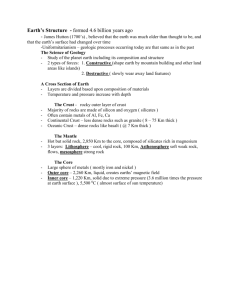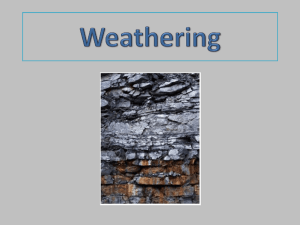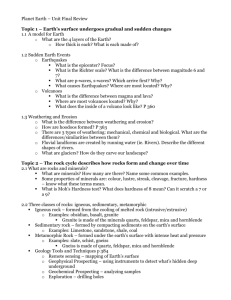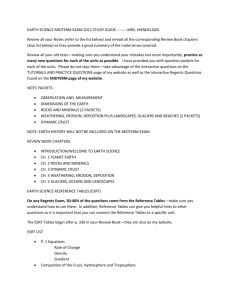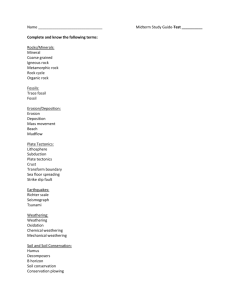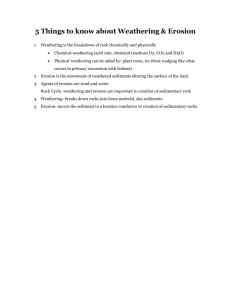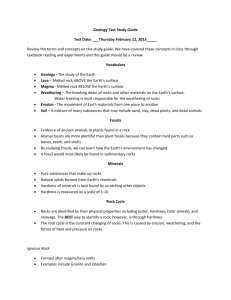Q_TYPE True False (001–055)
advertisement
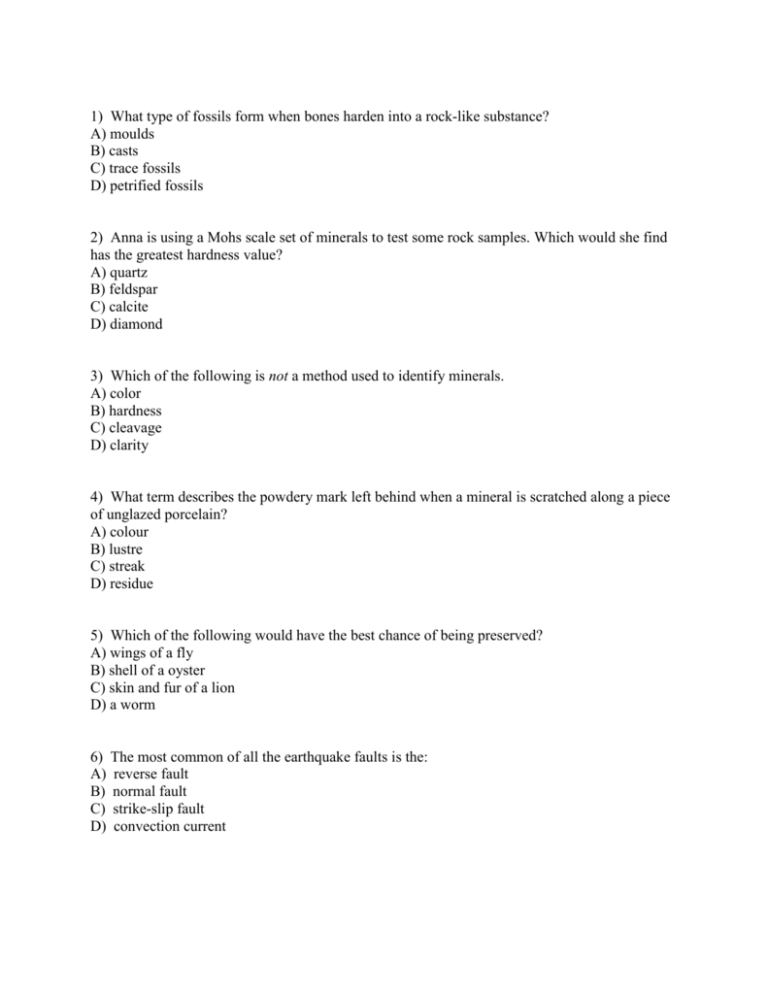
1) What type of fossils form when bones harden into a rock-like substance? A) moulds B) casts C) trace fossils D) petrified fossils 2) Anna is using a Mohs scale set of minerals to test some rock samples. Which would she find has the greatest hardness value? A) quartz B) feldspar C) calcite D) diamond 3) Which of the following is not a method used to identify minerals. A) color B) hardness C) cleavage D) clarity 4) What term describes the powdery mark left behind when a mineral is scratched along a piece of unglazed porcelain? A) colour B) lustre C) streak D) residue 5) Which of the following would have the best chance of being preserved? A) wings of a fly B) shell of a oyster C) skin and fur of a lion D) a worm 6) The most common of all the earthquake faults is the: A) reverse fault B) normal fault C) strike-slip fault D) convection current 7) Which of the following minerals is the softest on the Mohs Hardness Scale? A) soapstone B) feldspar C) talc D) shale 8) Which of the following is not an example of a metamorphic rock? A) granite B) gneiss C) marble D) pumice 9) Pierre is working on a project about sedimentary rocks. Which of the following should he include in his project? A) granite B) limestone C) feldspar D) marble 10) Which of the following terms describes a rock with a rough jagged edge? A) cleavage B) fracture C) hardness D) color Figure 4-1 11) The rock cycle shown in Figure 4-1 indicates that each type of rock can ____________________. A) provide materials to make other rocks B) form other rocks C) be changed by forces at Earth's surface D) all of the above 12) Figure 4-1 shows that sedimentary rocks are changed to sediment by ____________________. A) compaction B) weathering C) cementation D) melting 13) Rocks that break with smooth flat edges are known to have A) cleavage B) fracture C) clarity D) luster 14) Which of the following is the best example of chemical weathering? A) frost wedging B) acid rain C) tree roots D) landslides 15) Rocks that fall down a hill due to gravity is a result of A) chemical weathering B) biological weathering C) mechanical weathering D) erosion 16) A growing tree root can eventually split a rock. What is this process called? A) wind erosion B) biological weathering C) crop rotation D) desertification 17) Which of the following is not a form of mechanical weathering? A) frost wedging B) gravity C) wind D) acid rain 18) What are tracks, burrows, and other evidence of animal activity known as? A) moulds B) casts C) trace fossils D) original remains 19) Frost wedging is caused by ____________________. A) acids freezing on rocks B) water and oxygen reacting C) water freezing and thawing D) rocks colliding with each other 20) When oceanic and continental plates collide, one plate is forced under the other. What term describes the areas where these plates overlap? A) subduction zones B) conduction zones C) convection zones D) subvection zones 21) What is the name of the supercontinent that formed over 200 million years ago? Hint: This supercontinent eventually broke up into the present day continents. A) Pangaea B) Rhodesia C) Gondwanaland D) Rhodinia 22) When organisms are preserved, in full or part, as fossils, what are they known as? A) trace fossils B) moulds C) casts D) original remains 23) Plates move apart at ____________________ boundaries. A) convergent B) stable C) divergent D) volcanic Ref: Use the following to answer question 24 24) The Ring of Fire surrounds which of the following oceans? A) Pacific Ocean B) African Ocean C) Atlantic Ocean D) Indian Ocean 25) Plate move together at _____________________ boundaries. A) convergent B) stable C) divergent D) volcanic 26) The layer of the earth that is the thinnest of all is the A) inner core B) outer core C) crust D) upper mantle 27) Which of the following terms is the correct definition of the visible layers we see in a section of soil? A) strata B) stratification C) layering D) soil profile 28) Most earthquakes happen ____________________. A) without warning B) in areas where earthquakes have occurred in the past C) along plate boundaries D) all of the above 29) The point above the earth in which an earthquake occurs is the ____________________. A) focus B) epicentre C) fault D) hot spot 30) Which term describes volcanoes that are not currently erupting? A) active B) dormant C) sleeping D) extinct 31) If a layer of sandstone lies on top of a layer of limestone in which a 300 million-year-old fossil is found, the layer of sandstone must be ____________________. A) older than 300 million years B) younger than 300 million years C) the same age as the limestone D) older than 600 million years 32) The portion of soil which supplies the nutrients for plant growth is A) humus B) fertile soil C) compost D) topsoil 33) Which option lists the layers of Earth's crust in order from the centre of Earth to its surface. A) inner core, outer core, mantle, crust B) mantle, crust, outer core, inner core C) crust, outer core, inner core, mantle D) crust, mantle, outer core, inner core 34) Which of the following is not a type of earthquake wave? A) primary or P wave B) L wave C) surface wave D) secondary or S wave 35) Where does an earthquake begin within Earth? A) focus B) epicentre C) fault D) focal point 36) Which of the following volcanoes has been the most active? A) Mount St. Helens, Washington, USA B) Mount Vesuvius, Italy C) Mount Kilauea, Hawaii D) Mount Pinatubo, Philippines 37) Which is more likely to be preserved as a fossil? A) bear fur B) salamander's skin C) insect shell D) leech 38) The name of the rock before it goes through the changes to become a metamorphic rock is called A) changed rock B) sedimentary rock C) parent rock D) igneous rock 39) The hottest of all the layers of the earth is the A) crust B) mantle C) inner core D) outer core 40) What is the correct order of events in the eruption of Mount St. Helens? A) B, A, C, D B) B, D, A, C C) A, B, D, C D) A, C, B, D Planet Earth Exam Please do not write in this booklet!!! Enter your answer on the scantron provided. Let’s rock and roll!! Moh says “This test is not that hard”
